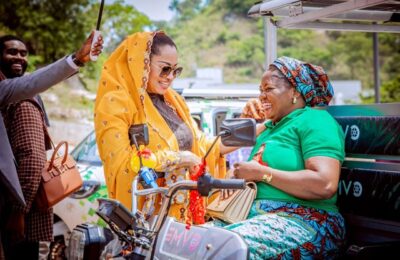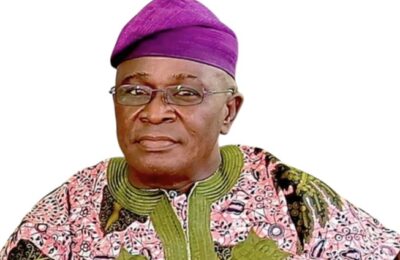Kogi State Governor, Idris Wada, in this interview with Jaiyeola Andrews, spoke on the achievements of his four-year administration and why the people should return him for a second term in the November 21 election
You are gunning for the second term, what would you say you have put on ground that would motivate people to re-elect you for the second time?
The first thing I have done is to put the state on the path of sustainable development. At the beginning of my administration, we came up with five clear pillars of development as a blueprint for the transformation of the state. Focusing on agriculture, industrialization because of the abundance of mineral resources we have in the state, human capital development – health and education, developmental infrastructure of the state and good governance. In all of these we have made very solid progress and our transformation agenda for the state is on a ten-year plan and we believe that we have a chance of second term of another four years to consolidate on some of the achievements we have made and build them and do new things along those same lines, by the time we complete eight years out of a ten-year plan it would be basically irreversible, because by that time substantial achievements would have been made on meaningful projects that will impact on the lives of the people and the economy of the State.
If we go back home we are building a motor park that will be turning over 10,000 passengers a day to tidy up transportation in the state capital because of our strategic location as a melting pot for people from all over the state that pass through Lokoja. We now have a park that can accommodate many vehicles, trailers, buses, taxis everybody has their place there. There are facilities and it is like an airport terminal that is what we are building and it if for comfort for those who are travelling through Lokoja. About two and half months ago we just commissioned the most modern vocational training centre in this country in cooperation with Korea Development Agency.
This is to train youths, give them skills to be able to fend for themselves as government jobs are very difficult to come by and even jobs from private organisations. We empower the youths, we started with a programme called YAD4Kogi: Youths Advancement Programme for Kogi. Where we were able to take people who are despondent, who have lost hope, bring them back, raise their morale, give them confidence and train them on skills to be able to fend for themselves. In cooperation with Dangote we are building another Robotic Vocational Training Centre, because industries are moving from using too many human beings to using robots, we are moving ahead and there will be a centre for training our youths on such developments.
On agriculture, before we come in it was subsistence farming. Now we are promoting agriculture because about 70 to 80% of our people live on agriculture. We are now turning agriculture to a business for them to improve their wealth and welfare and the lives of their family. Agriculture is now a very popular profession in Kogi State. We are now recognised as a rise growing state because we are processing and bagging rice. This has never happened in our 24 year history, but is happening now. This is because we are supporting agriculture by giving subsidise inputs, engaging extension workers to teach them how to farm, proving improve seedlings, fertilizer and things like that to help our farmers.
Also we are building and very soon we will commission power tillers. These are like motorcycles, but agricultural equipment which are operated by individuals which will improve the productivity of our famers. The truth is that mechanise farming needs to be done systematically, you can’t just jump from using hoe and cutlass to tractors. How would a farmer buy diesel to power the tractor, how would he be able to drive the tractors without being taught? That is why we want to move from hoe and cutlass type of farming to power tillers. These are portable tractors, which individuals can use to reduce the energy and time they spend using traditional implements. From there later as they improve they can move to tractors. We are also providing subsidise tractors to organised cooperatives and group of farmers. We have made land acquisition for agriculture very easy and straight forward process. We have reorganised farming and land tenure system in Kogi State. It is very easy to get C of O and all that now. If you have a meaningful project and you are sincere and have the funding to support it.
On education, we have built more than 400 class rooms at the basic education level, renovated many in all the local government areas in our state, provided teaching materials and training for our teachers. If you go to all our iconic secondary schools whether they are missionary or government schools, they have produced the first generation leaders and believe that we owe it to them to turn around those schools. For thirty years nobody has looked at them, but if you go there now you will be very proud of what we have done. In our secondary education we have provided training for teachers, improving and building new facilities for our people.
In terms of other infrastructure in Lokoja, we are doing a solid embankment for flood control because of the experienced we had in 2012 at Kabawa Area there is a lot of work going on to prevent flooding and thank God this year we have been able to prevent flooding. Our Lokoja Greater Water project which was almost under water in 2012, we have built an embankment now and based on the hydrological data available to us now we are told that for the next thirty years there is no level of flood that will put water supply to Lokoja in danger again, because that embankment will protect it from flooding.
We are building a building a dual bypass road from Ganaja to Otokiti that is in the zone 8 area of Lokoja so as to divert traffic that is going from the east to the west of Kogi State and they would no longer need to pass the centre of Lokoja. This causes a lot of traffic conjunction and damage to the road, for this reason, we are now building a 16 kilometre bypass. If you are going from say Ankpan to Abuja you don’t have to go into Lokoja, you only need to go round and join the highway and the same if you are coming from Abuja you don’t have to go through the town. Where you have trailers, buses all competing through the nerve road in the city it leads to traffic conjunction.
You know we are providing the first subsidised intra-city bus services in this country. In Lokoja people 50 naira from one end to another end it is not done anywhere in this country. It is not par drop, from where you start to the end of the bus stop all you pay is 50 naira, we have Leyland Buses going from various parts of the states. This we believe is saving our workers about 60% of their transport fare of going to work or going to do their businesses. It is the first of its kind in this country and it is private sector driven. It is managed by a private company, but we subsidise it to reduce the burden on our workers. You also know that we have building a 25,000 capacity stadium which was started by my predecessor and we have completed and commission it and it is now functional and several other projects we are doing in the state, they just too many: we have built more than 400 health centres, we have brought electricity to rural communities, water – motorised borehole, hand pumped boreholes to more than 400 communities in the state. We focus on rural development, of course we are not a very rich state so with our little resources we try and focus on areas with maximum impact. That is why you don’t see us doing very big, big projects, but we do few ones that make life easy.
How were you able to handle the insecurity situation that engulfed the state?
In terms of insecurity, the first and the most important duty of government is to protect lives and properties. When I came in there was a lot of youth restiveness, some call it thuggery, insecurity particularly in the Central Senatorial District. People were being killed every day and it became a normal thing to them. I came with a very clear agenda of zero tolerance to violence – everybody is equal under the law and the law must take its course and I galvanised the security agencies available, encouraged them with funding and equipment support and they saw that the governor’s posture is that of non-interference in the administration of law enforcement and also that there is no sacred cow if you are caught you would be prosecuted and where they saw I would not condole violence many people have to back track.
How is Kogi State faring in the area of workers’ salaries, what is the status of the bailout fund have you been able to access them and what is your take on the clamour for power shift in the state?
Workers’ welfare has been a priority for my administration and you know there are three tiers of government in Nigeria: Federal, State and Local and local governments are a tire of their own and they get their allocation directly from the federation account. These allocations are used for payment of teachers’ salaries and in Kogi State we spend 1.2 billion every month and this goes to SUBEB. The balance of the money is for payments of Local Government workers salaries; local government development efforts – we have a law in the state that 5% of the income from the local governments goes to the traditional council for payments to our various traditional rulers and all that; 1% goes to the Local Government Service Commission to run the affairs of the commission another 1% is deducted and accrued for the running of the Kogi State University. It is a state university and there is a law passed by the assembly to allocate 1% of the revenue of the state and local government. The balance is what we use to pay local government workers’ salaries, also some development some development projects where possible in the local governments.




